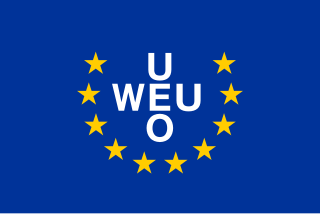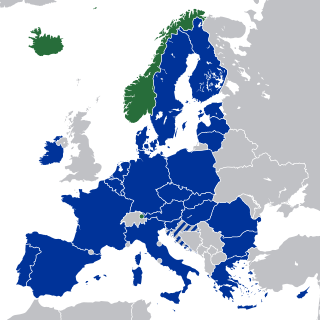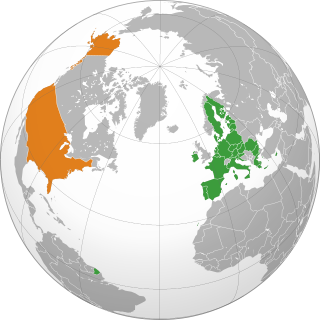| |||||
| Decades: | |||||
|---|---|---|---|---|---|
| See also: | |||||
Events in the year 1993 in the European Union .
1993 was designated as:
- European Year of the Elderly and of Solidarity between Generations
| |||||
| Decades: | |||||
|---|---|---|---|---|---|
| See also: | |||||
Events in the year 1993 in the European Union .
1993 was designated as:
The European Capital of Culture is a city designated by the European Union for a period of one calendar year, during which it organises a series of cultural events with a strong European dimension.

The Council of the European Union, often referred to in the treaties and other official documents simply as the Council, and informally known as the Council of Ministers, is the third of the seven Institutions of the European Union (EU) as listed in the Treaty on European Union. It is one of two legislative bodies and together with the European Parliament serves to amend and approve or veto the proposals of the European Commission, which holds the right of initiative.

The European Union (EU) is a supranational political and economic union of 27 member states that are located primarily in Europe. The union has a total area of 4,233,255.3 km2 (1,634,469.0 sq mi) and an estimated total population of nearly 447 million. The EU has often been described as a sui generis political entity combining the characteristics of both a federation and a confederation.

The European Council is a collegiate body that defines the overall political direction and priorities of the European Union. The European Council is part of the executive of the European Union (EU), beside the European Commission. It is composed of the heads of state or government of the EU member states, the President of the European Council, and the President of the European Commission. The High Representative of the Union for Foreign Affairs and Security Policy also takes part in its meetings.

The European Commission (EC) is part of the executive of the European Union (EU), together with the European Council. It operates as a cabinet government, with 27 members of the Commission headed by a President. It includes an administrative body of about 32,000 European civil servants. The Commission is divided into departments known as Directorates-General (DGs) that can be likened to departments or ministries each headed by a Director-General who is responsible to a Commissioner.

The Western European Union was the international organisation and military alliance that succeeded the Western Union (WU) after the 1954 amendment of the 1948 Treaty of Brussels. The WEU implemented the Modified Brussels Treaty. During the Cold War, the Western Bloc included the WEU member states and the United States and Canada as part of the North Atlantic Treaty Organization (NATO).

The European Economic Area (EEA) was established via the Agreement on the European Economic Area, an international agreement which enables the extension of the European Union's single market to member states of the European Free Trade Association. The EEA links the EU member states and three EFTA states into an internal market governed by the same basic rules. These rules aim to enable free movement of persons, goods, services, and capital within the European single market, including the freedom to choose residence in any country within this area. The EEA was established on 1 January 1994 upon entry into force of the EEA Agreement. The contracting parties are the EU, its member states, and Iceland, Liechtenstein, and Norway.

The euro area, commonly called eurozone (EZ), is a currency union of 20 member states of the European Union (EU) that have adopted the euro (€) as their primary currency and sole legal tender, and have thus fully implemented EMU policies.

The president of the European Council is the person presiding over and driving forward the work of the European Council on the world stage. This institution comprises the college of heads of state or government of EU member states as well as the president of the European Commission, and provides political direction to the European Union (EU).
European integration is the process of industrial, economic, political, legal, social, and cultural integration of states wholly or partially in Europe or nearby. European integration has primarily come about through the European Union and its policies.

Relations between the European Union and the United States began in 1953, when US diplomats visited the European Coal and Steel Community in addition to the national governments of its six founding countries. The two parties share a good relationship which is strengthened by NATO, cooperation on trade, and shared values.

Relations between the European Union (EU) and Ukraine are shaped through the Ukraine–European Union Association Agreement and the Deep and Comprehensive Free Trade Area (DCFTA). Ukraine is a priority partner within the Eastern Partnership and the European Neighbourhood Policy (ENP). The EU and Ukraine have been seeking an increasingly close relationship, going beyond co-operation, to gradual economic integration and deepening of political co-operation. On 23 June 2022, the European Council granted Ukraine the status of a candidate for accession to the European Union.

This is a timeline of European Union history and its previous development.
Events in the year 2010 in the European Union.

In the European Union (EU), enhanced cooperation is a procedure where a minimum of nine EU member states are allowed to establish advanced integration or cooperation in an area within EU structures but without the other members being involved. As of October 2017, this procedure is being used in the fields of the Schengen acquis, divorce law, patents, property regimes of international couples, and European Public Prosecutor and is approved for the field of a financial transaction tax.
Events from the year 1996 in the European Union.
Events in the year 1995 in the European Union.

European Union–Kazakhstan relations are the international relations between the Republic of Kazakhstan and the common foreign policy and trade relations of the European Union.

The Treaties of the European Union are a set of international treaties between the European Union (EU) member states which sets out the EU's constitutional basis. They establish the various EU institutions together with their remit, procedures and objectives. The EU can only act within the competences granted to it through these treaties and amendment to the treaties requires the agreement and ratification of every single signatory.
The Conference on the Future of Europe was a proposal of the European Commission and the European Parliament, announced at the end of 2019, with the aim of looking at the medium to long term future of the EU and what reforms should be made to its policies and institutions. It is intended that the Conference should involve citizens, including a significant role for young people, civil society, and European institutions as equal partners and last for two years. It will be jointly organised by the European Parliament, the EU Council and the European Commission. On 19 April 2021, the multilingual digital platform of the Conference futureu.europa.eu was launched.